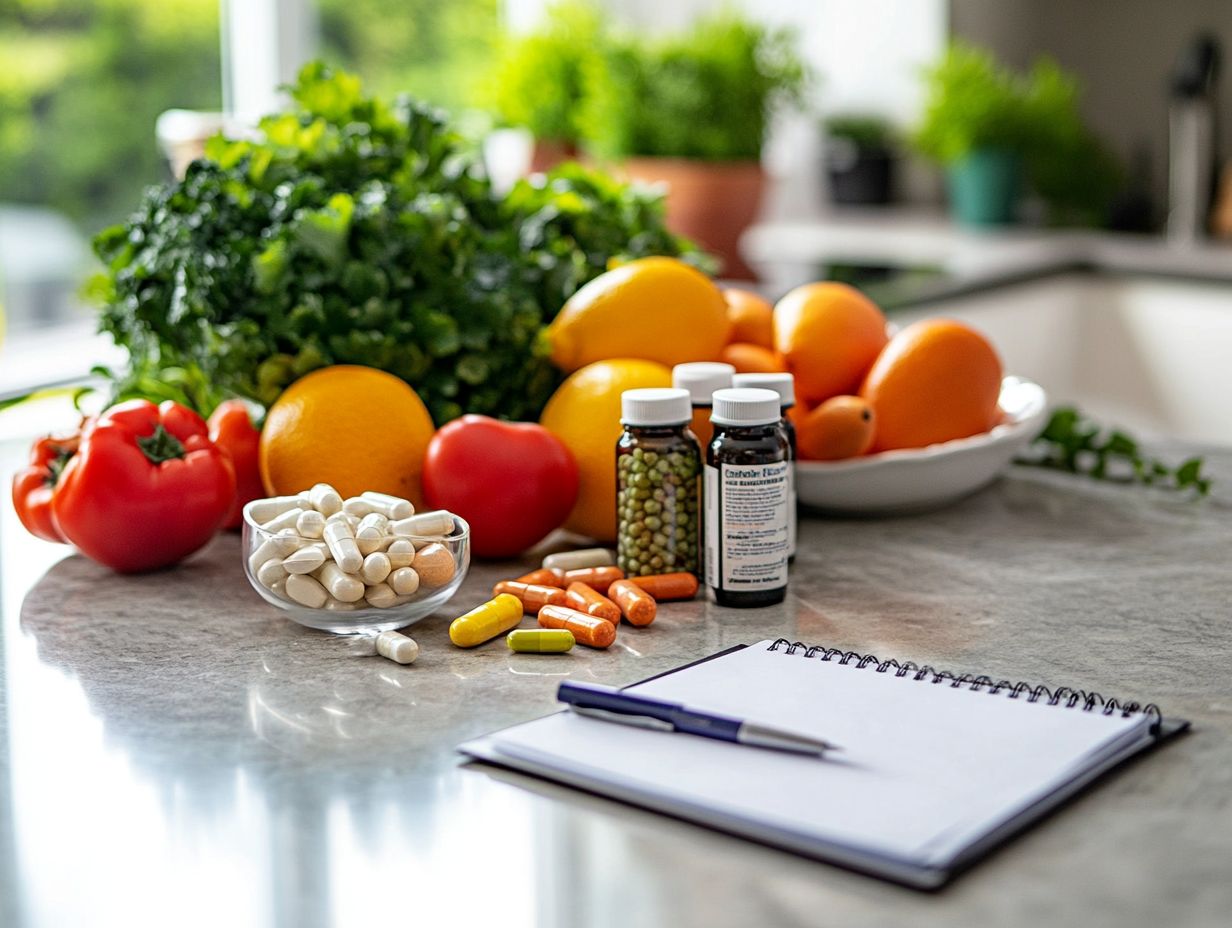5 Dietary Supplements to Enhance Fertility
Understanding fertility can feel like a daunting task, but grasping the significance of dietary supplements could be crucial in enhancing your chances.
This article delves into five essential supplements Folic Acid, Coenzyme Q10, Vitamin D, Omega-3 Fatty Acids, and Zinc that play a vital role in supporting reproductive health.
You ll discover how these nutrients function, the recommended dosages, potential side effects, and alternative natural methods to elevate your fertility.
Embrace this opportunity to empower your fertility journey!
Contents
- Key Takeaways:
- 1. Folic Acid
- 2. Coenzyme Q10
- 3. Vitamin D
- 4. Omega-3 Fatty Acids
- 5. Zinc
- Wondering if Dietary Supplements Are Essential for Boosting Your Fertility?
- How Do These Supplements Help with Fertility?
- What Are the Recommended Dosages for These Supplements?
- Are There Any Potential Side Effects of Taking These Supplements?
- What Are the Other Ways to Enhance Fertility Naturally?
- Frequently Asked Questions
Key Takeaways:

- Folic acid plays a crucial role in fetal development and can increase the chances of conception.
- Coenzyme Q10 is an antioxidant that helps protect cells from damage, improve sperm quality, and increase egg production in women.
- Vitamin D deficiency has been linked to decreased fertility in both men and women, so supplementing with it may be beneficial.
1. Folic Acid
Folic acid, an essential B vitamin, plays a pivotal role in reproductive health by supporting the development of healthy eggs and sperm. This makes it critical for couples aspiring to conceive and ensuring a healthy pregnancy.
This nutrient helps prevent deficiencies and enhances overall reproductive wellness. If you’re aiming for conception, incorporating foods rich in folate like leafy greens, legumes, and fortified cereals into your diet can be incredibly beneficial.
The synergistic relationship between folic acid and other B vitamins, particularly B6 and B12, further aids in hormone regulation and may enhance fertility outcomes.
Understanding the importance of folic acid, many prenatal multivitamins include this vital nutrient. This ensures that women receive adequate amounts before and during pregnancy, promoting healthy fetal development and reducing the risks associated with neural tube defects.
2. Coenzyme Q10
Coenzyme Q10, a powerful antioxidant, is essential for enhancing egg quality and promoting healthy sperm production, offering vital nutritional support for those pursuing fertility treatments or striving to conceive.
This remarkable compound is key in fighting oxidative stress, which can hinder reproductive functions. By neutralizing free radicals, CoQ10 boosts cellular energy production, crucial for the health of both egg cells and sperm. If you’re engaged in assisted reproductive technologies like IVF, adding CoQ10 to your regimen could lead to improved outcomes.
Recommended dosages usually range from 200 to 600 mg per day, so it s wise to consult with a healthcare provider before starting any supplementation. You might find that the benefits extend beyond reproductive health, enhancing your overall vitality as well.
3. Vitamin D
Vitamin D is gaining recognition for its essential role in fertility, impacting hormonal balance and addressing nutrient deficiencies that can influence reproductive health and overall well-being.
Research indicates that maintaining adequate levels of vitamin D can help regulate reproductive hormones such as estrogen and progesterone, both vital for ovulation and menstrual health. If you’re dealing with conditions like polycystic ovary syndrome (PCOS) or endometriosis, you may find that vitamin D aids in alleviating hormonal imbalances associated with these issues.
To boost your vitamin D levels, consider incorporating sources like fatty fish, fortified dairy products, and sunlight exposure into your routine. Supplementation may also be beneficial, especially during colder months or if your access to sunlight is limited.
While it’s generally advised to keep serum levels between 30-60 ng/mL, consulting a healthcare provider is crucial to tailor your supplementation to your specific needs.
Always consult a healthcare provider before starting any supplements!
4. Omega-3 Fatty Acids

Omega-3 fatty acids are essential fats that play a crucial role in reproductive health. They enhance sperm quality and may improve egg quality. Incorporating these fats into your diet can make a significant difference in your fertility journey.
These remarkable fats serve as powerful antioxidants, reducing oxidative stress that could adversely affect reproductive functions. Their anti-inflammatory properties foster an ideal environment for reproductive health, creating a supportive foundation for your body.
To boost your intake of these vital nutrients, consider including sources like fatty fish think salmon and mackerel as well as plant-based options such as flaxseeds and walnuts. If getting enough omega-3s from food proves challenging, supplementation could be a wise choice. Typical recommendations range from 250 to 500 mg of combined EPA and DHA per day.
These dietary adjustments support hormonal balance and improve fertility outcomes.
5. Zinc
Zinc is vital for reproductive health, playing a key role in the production of healthy sperm and supporting overall fertility. It s no wonder it s often included in dietary supplements for those looking to conceive.
This essential mineral isn t just important for men; it also helps regulate hormones in women, influencing ovulation and menstrual health. Maintaining adequate zinc levels may boost the effectiveness of fertility treatments, giving couples a better chance of conceiving.
You can easily incorporate zinc into your diet through rich sources like red meat, shellfish, legumes, seeds, and nuts. If you re considering supplementation, a daily intake of around 15-30 mg is typically recommended. However, it s wise to consult a healthcare professional for personalized advice tailored to your needs.
Wondering if Dietary Supplements Are Essential for Boosting Your Fertility?
The necessity of dietary supplements for fertility often hinges on your individual health profile, lifestyle factors, and any nutrient deficiencies you might have. This makes them a significant consideration if you’re trying to conceive or looking to support your reproductive health.
Fertility specialists emphasize that various lifestyle choices like your diet, exercise routine, and stress management can dramatically influence fertility outcomes. For example, a balanced diet rich in essential nutrients is crucial. If you re dealing with conditions like PCOS or endometriosis, you may need to increase your intake of specific vitamins and minerals. Your age and exposure to environmental toxins can complicate your nutritional needs.
The right supplements, tailored to your unique profile, can offer numerous benefits. They can enhance ovulation, improve sperm quality, and contribute to a healthier pregnancy, ultimately creating a more favorable environment for conception.
What Are the Key Nutrients for Fertility?
Several key nutrients are essential for your fertility journey, including:
- Folic Acid
- Vitamin D
- CoQ10
- Omega-3 Fatty Acids
- Zinc
Together, they promote healthy reproductive function and enhance your chances of conception.
These nutrients work in harmony to support various facets of reproductive health. For instance, folic acid is critical for DNA synthesis and repair, aiding in embryo development, while vitamin D has been linked to improved ovarian function. Similarly, CoQ10 acts as a potent antioxidant, boosting cellular energy production an essential factor for gamete quality.
Omega-3 fatty acids not only help reduce inflammation but also play a significant role in hormone regulation, which is vital for maintaining regular reproductive cycles. Zinc is crucial for the healthy production of sperm and testosterone in men.
Numerous studies highlight the significance of a well-balanced diet rich in these nutrients. Their interconnected roles optimize fertility and enhance overall reproductive outcomes.
Take charge of your fertility today by prioritizing these key nutrients in your diet!
How Do These Supplements Help with Fertility?

Dietary supplements can significantly enhance your fertility. They deliver essential vitamins and minerals that improve sperm and egg quality, support hormonal balance, and counteract oxidative stress with antioxidants. Ultimately, these factors promote overall reproductive health.
Research indicates that specific supplements, such as coenzyme Q10 and omega-3 fatty acids, enhance mitochondrial function and reduce inflammation. Both are crucial for optimal reproductive performance. For example, a study published in Fertility and Sterility revealed that men who supplemented with coenzyme Q10 saw notable improvements in sperm motility and concentration.
A balanced intake of zinc and folic acid also correlates with better fertility outcomes in women undergoing assisted reproductive technologies. While these targeted supplements play an essential role, adopting a balanced and holistic approach to nutrition, lifestyle, and stress management creates a nurturing environment conducive to conception.
What Are the Recommended Dosages for These Supplements?
Understanding the recommended dosages for dietary supplements is essential for those trying to conceive. Appropriate levels of vitamin D, CoQ10, omega-3 fatty acids, and zinc can greatly impact fertility outcomes.
Key factors, like your age and overall health, may require adjustments to these dosages. This underscores the importance of personalized guidance. For instance, healthcare providers often customize vitamin D recommendations based on your current levels and geographic location. CoQ10 dosages might be modified for those undergoing fertility treatments.
Omega-3 fatty acids are typically recommended for both partners. However, the amounts can vary based on dietary habits and lifestyle choices. Zinc is crucial for reproductive health and warrants careful consideration for both men and women, especially if deficiencies exist.
Consulting with a qualified health professional is vital to determine the most effective supplementation strategy tailored to your unique needs.
Are There Any Potential Side Effects of Taking These Supplements?
While dietary supplements for fertility can offer a range of benefits, it s crucial to stay informed about the potential side effects from excessive intake, particularly concerning vitamin D, omega-3 fatty acids, and zinc.
For example, an overdose of vitamin D can lead to toxicity, causing symptoms like nausea and weakness. Similarly, too much omega-3 fatty acids could heighten the risk of bleeding. Overconsumption of zinc might disrupt the absorption of other vital minerals and lead to digestive discomfort.
To mitigate these risks, consulting with healthcare providers is essential. They can provide tailored advice on dosages specific to your needs.
By monitoring your intake and paying attention to how your body responds, you can ensure a safer journey toward achieving optimal health and fertility.
What Are the Other Ways to Enhance Fertility Naturally?
Beyond dietary supplements, several natural methods to enhance fertility hinge on lifestyle factors. These include diet, exercise, stress management, and addressing nutrient deficiencies all vital to reproductive health.
These holistic approaches are essential for creating an environment that is nurturing for conception. A balanced diet, rich in whole grains, fruits, vegetables, lean proteins, and healthy fats, provides the necessary nutrients to support hormonal balance and ovulation.
Engaging in regular physical activity tailored to your capabilities helps maintain a healthy weight and reduces stress, which boosts fertility. Incorporating mindfulness practices such as yoga and meditation can significantly ease anxiety, enhancing your emotional well-being.
By making these lifestyle adjustments and embracing specific dietary choices like adding antioxidants and omega-3 fatty acids you can pave the way for improved fertility outcomes.
Frequently Asked Questions

What are the top 5 dietary supplements to enhance fertility?
The top 5 dietary supplements for boosting fertility include Coenzyme Q10, Folic Acid, Omega-3 Fatty Acids, Vitamin D, and Zinc!
How do Coenzyme Q10 supplements help improve fertility?
Coenzyme Q10 is an antioxidant that can enhance egg and sperm quality. This makes it easier to conceive.
Why is Folic Acid important for fertility?
Folic acid is vital for the development of the baby’s neural tube, which forms the brain and spinal cord. It also helps with DNA production and regulates ovulation in women.
Can Omega-3 Fatty Acids improve male fertility?
Yes! Studies show that Omega-3s can boost sperm count, movement, and shape. They also reduce inflammation, improving overall fertility.
What is the role of Vitamin D in fertility?
Vitamin D helps regulate hormones like estrogen and testosterone, which are key for fertility. It also supports cell growth and improves egg and sperm quality.
How does Zinc affect fertility?
Zinc is essential for both male and female fertility. It supports sperm production and movement in men, while helping regulate ovulation and hormone levels in women.
A lack of Zinc has been linked to miscarriages and birth defects, making it crucial for those trying to conceive.






